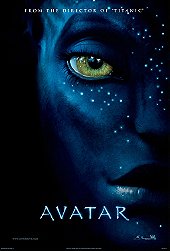With 2009's Avatar, visionary director James Cameron proves that there's at least one filmmaker in Hollywood capable of putting a $300 million budget (or was it $500 million?) to good use. Cameron's first feature film outing since 1997's Titanic, this hotly-touted flick has spent years brewing in post-production and triggered fevered discussion about the possibilities of its revolutionary digital effects (developed in part by the hands-on director himself). Up until the mid-months of 2009, Avatar had been shrouded in secrecy (dedicated internet fanboys can attest to this fact), but one thing was made clear: it would be a groundbreaking cinematic event, and the advanced motion-capture technology would elevate filmmaking to the next level. While the storytelling and characterisations admittedly remain stuck in the past, Avatar is visual moviemaking 2.0 in an extremely satisfying and exhilarating way. As long as you're not one of those people who've made up their minds prior to viewing Cameron's latest masterwork (in other words, if you're not one of those who brand the film as a Fern Gully rip-off and criticise the CGI as videogame-calibre), Avatar is a tremendously rewarding, soulful experience.

Set in the year 2154, the Earth is dying and faraway planets are being targeted for strip-mining. In a neighbouring star system lies the exotic-but-deadly planet of Pandora; the source of an ultra-valuable mineral known as Unobtainium. Naturally, a sinister corporation has set up base on the planet and wishes to commence their operation. Standing in their way, however, is the indigenous population of Pandora - the Na'vi; a race of tall, blue-skinned tree-dwellers whose civilisation rests atop possibly the richest deposit of Unobtainium in existence, but have no desire to relocate. Enter the "Avatar" program, which sees people transfer their consciousness to half-human, half-Na'vi hybrids which can be controlled telepathically. It's hoped that through this program, the aliens can be gently persuaded to move out of mankind's way. Soon, a disabled ex-marine named Jake Sully (Worthington) is unwillingly thrust into the situation when his twin brother suddenly dies. Through using his Avatar, Jake is accepted as part of a Na'vi tribe and falls in love with a female Na'vi warrior named Neytiri (Saldana). With an epic battle for the fate of Pandora drawing dangerously close, Jake must choose his side.
Cameron wastes no time before plunging viewers straight into the world of Pandora; not even allowing any time for an audience to adjust to this breathtaking new technology. In a masterfully efficient opening 10 minutes, writer-director Cameron introduces everything one will need to know for the following 2½ hours - about Pandora's climate and population, about Jake's situation, about the ruthless plans of the humans and about the Avatar program. From that point onwards, the film is off and running. At an intimidating 160 minutes, Avatar never feels too long or flabby - there's just so much movie crammed into these 160 epic minutes: the human stories, the Na'vi stories, the bio-diversity of the planet, and above all the warfare, with Jake joining the resistance against his former allies. While things are slowed down for the middle hour as Jake's infiltration operation gestates, it's astonishing how brilliantly-paced the film is. Unlike other CGI-heavy movies against which Avatar will be judged (including the abominable Transformers: Revenge of the Fallen and Terminator Salvation), Cameron's movie is superbly constructed; using all 160 minutes to judiciously build characters and establish relationships before all the strands culminate for an epic, action-packed climax. Since such a perfect emotional connection is built, a viewer will care about what happens to the protagonists and the Na'vi tribe.

In terms of storyline, Avatar offers nothing unprecedented. The plot is reminiscent of the likes of Dances with Wolves and The New World, in which a 'civilised' westerner lives amongst a supposedly backwards society and slowly sides with the noble savages. Heck, the characters are largely predictable too. But in the context of the movie, all these elements come together perfectly. The fact that it all succeeds is a testament to Cameron's skill at working formula and familiar story elements with a skilful dexterity very few can match. Of course, Avatar is not just about spectacle and action (though both elements are offered in spades) - it's primarily a love story. This is hardly surprising, of course, since more or less every Cameron film is a love story at its core (Titanic, The Terminator, etc). The surprise here is the effectiveness of the central coupling, thanks in large part to Weta's staggering digital effects. It's impossible to overstate how real the Na'vi look; every facial movement, and every movement in general seems organic. They may not always appear photo-real, but they do seem alive. The dead-eye problem plaguing motion capture movies for years has been well and truly solved - these CGI characters are imbued with a soul.
James Cameron and his crew created Pandora from the ground up using a mixture of motion-capture techniques and computer-generated animation. As a result, Avatar is an astonishing feast for the eyes, with ethereal, invigorating shots and sequences genuinely unlike anything you've ever seen before. The level of immersive detail displayed in this tour de force is extraordinary. But the true success is in the seamlessness - not a single shot stands out as blatant green screen. Live-action and digital elements are so skilfully integrated that the point where the live-action ceases and the digital effects begin is impossible to determine, which ensures the illusion is unbroken. Pandora truly feels like a living, breathing world, and it's as if Cameron is the planet's most enthusiastic tour guide. James Horner's score, meanwhile, is atmospheric and appropriate; gloriously supporting the exotic beauty of the jungles of Pandora (though it lacks a memorable underlying theme as a hook).

One thing that distinguishes Cameron from young pretenders like Michael Bay and McG is that he anchors his epic visions with relatable emotions handled with utmost sincerity. Of course, it also helps that Cameron remains one of the best action directors in the business. Avatar concludes with a climactic showdown between human and Na'vi forces - it's a battle royale of excitement, thrills and tragedy that's both truly epic and rivetingly intimate. It's a wonder to behold. In a decade where action choreography is constantly masked by frantic editing, Cameron proves himself once again to be the old-school master. Younger filmmakers should also take note of the prudent use of 3-D which is perceived as an enhancement rather than a gimmick. Cameron never garishly breaks the fourth wall since the 3-D is employed to generate a sense of depth - a viewer feels like they're glancing into an open window of another world. Never before has the effect felt so unintrusive; never before has CGI felt so natural, necessary and alive. If you plan to see the film in 2-D via DVD or a downloaded version filmed from within a cinema...there's no talking to you. Avatar is a cinematic experience and an event, not a mere film.
It's crucial to note that, in most cases, cinematic displays of new technology are rubbish. The technology is usually then refined, and applied to a superior movie. But this is not good enough for James Cameron, who has managed to push the boundaries with new technology while simultaneously creating an excellent, full-throttle piece of entertainment. Avatar is also rather reminiscent of the great epics of yesteryear - from Spartacus to Gone with the Wind. Such classics relied on universal themes and enthralling characters to drive their sprawling narratives, and Avatar is no different. It's stirring drama on a vast canvas painted with broad brush-strokes, and the audience is powerless to prevent themselves from being swept up in the action and emotion.

As Jake Sully, Sam Worthington places forth a charming and spellbinding performance (both in and out of his Avatar). His soulful eyes are an asset; a quality that's retained and magnified in his Na'vi form. Zoe Saldana, however, is the standout as Neytiri. For her entire performance she plays behind a CGI face, yet she makes Neytiri into a thoroughly multi-faceted character endowed with a fully conveyed emotional personality. Witnessing Sigourney Weaver re-teaming with James Cameron is a joy (a good omen, since Aliens is one of Cameron's best film). Even if it's only a small part, Weaver's role as the chief scientist is a memorable and integral part of the narrative. Every minor character - no matter how clichéd - is played with gusto and earnestness by the marvellous cast (a group of talented thespians, rather than big stars). Stephen Lang clearly relished the opportunity to play the evil Colonel Quaritch. Also in the cast is an underused but nonetheless extremely effective Michelle Rodriguez as a sympathetic pilot, on top of the endearing Giovanni Ribisi who's pitch-perfect as another corporate scumbag.
In creating Avatar, James Cameron additionally inserts undertones relating to corporate greed, as well as complex questions about what it means to be human. Underneath the spectacle are subtle equivalences to the Vietnam and Iraq Wars, but these are not restricted by any means - the story is broad enough to apply to any indigenous race under threat from superior external imperialist forces. Avatar clearly sides with the Na'vi population, and portrays the Americans as the monsters. Some might find the environmental message of the film too preachy, but it never openly shoves this agenda down our throats; it simply sits beneath the surface, ripe for analysis if we choose to dig further. In spite of its strengths, Avatar does lean slightly towards spectacle over script; the story is no dud, but while discussing the movie you'll be inclined to discuss what you've seen, rather than quote lines (there's no killer banter). Minor script flaws aside, this is a superb blockbuster. It has to be seen on the big screen - in 3-D, no less.
9.55/10
 Login
Login